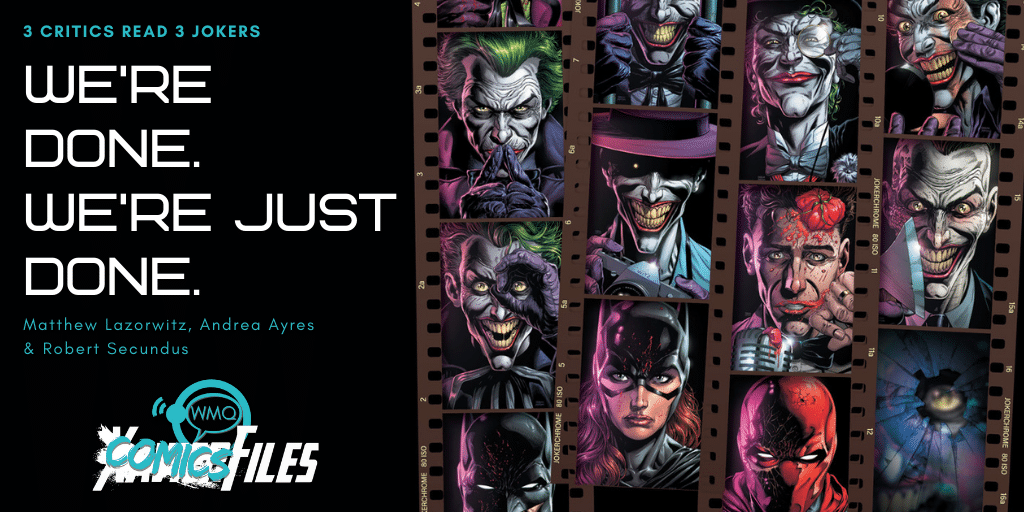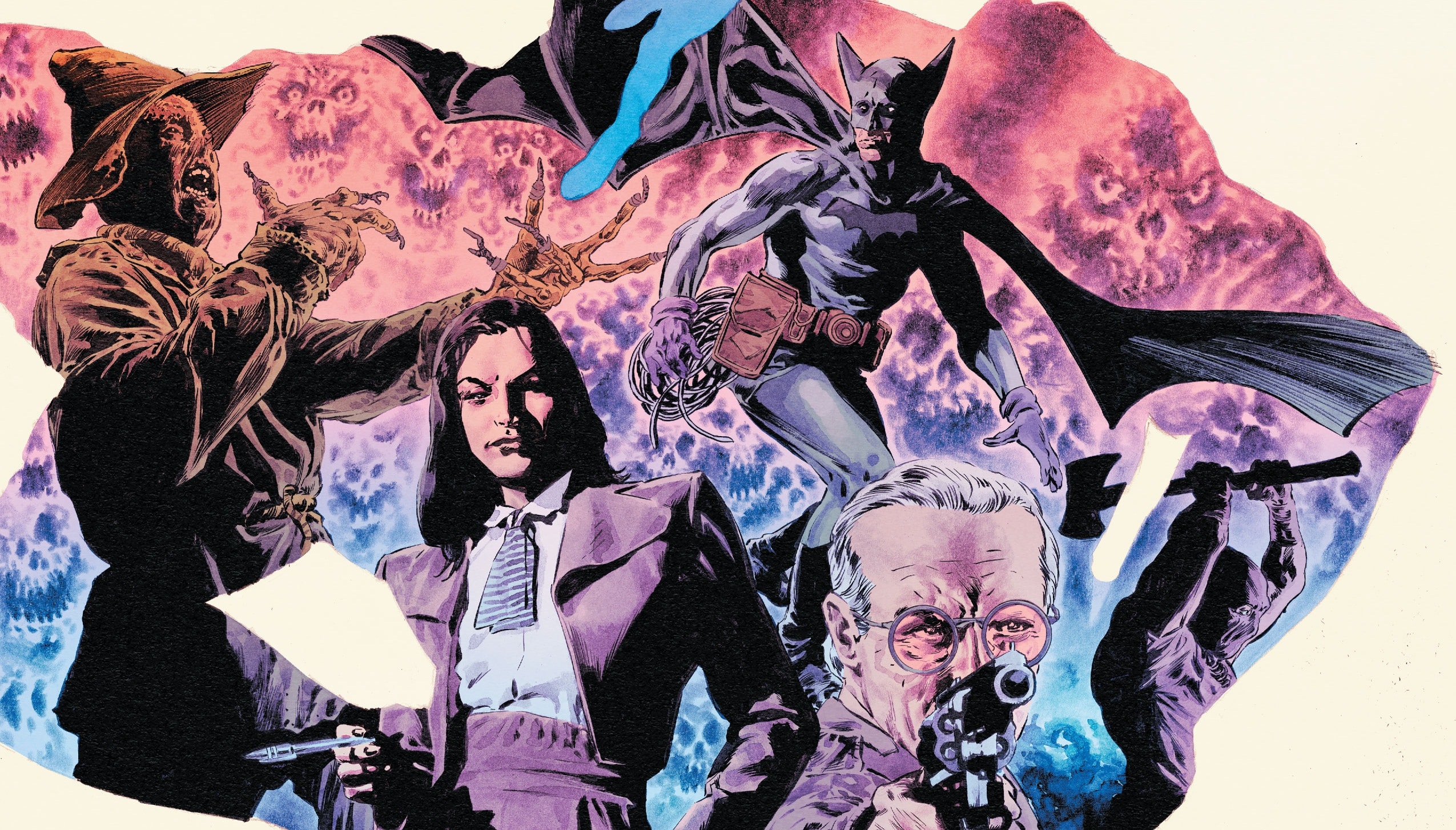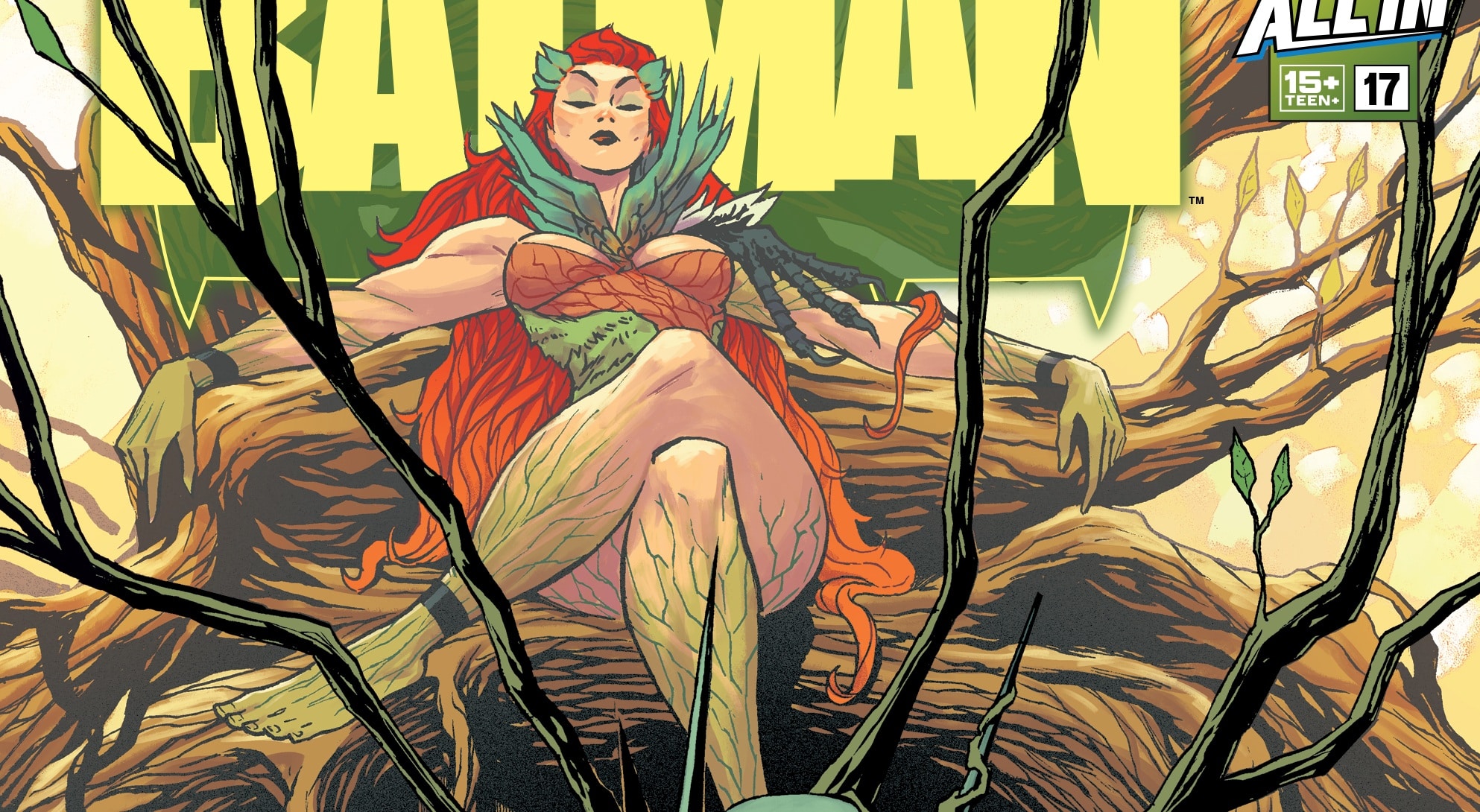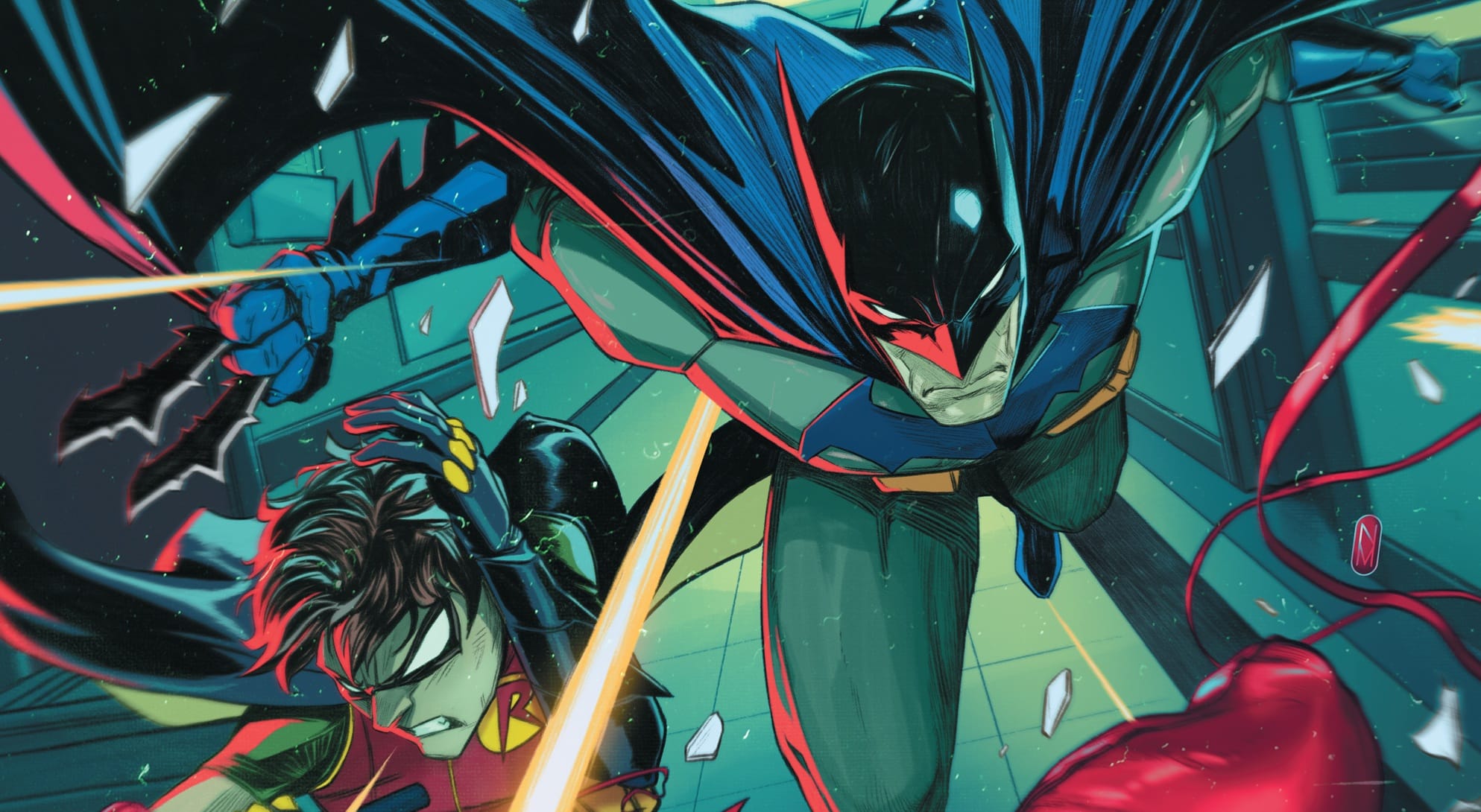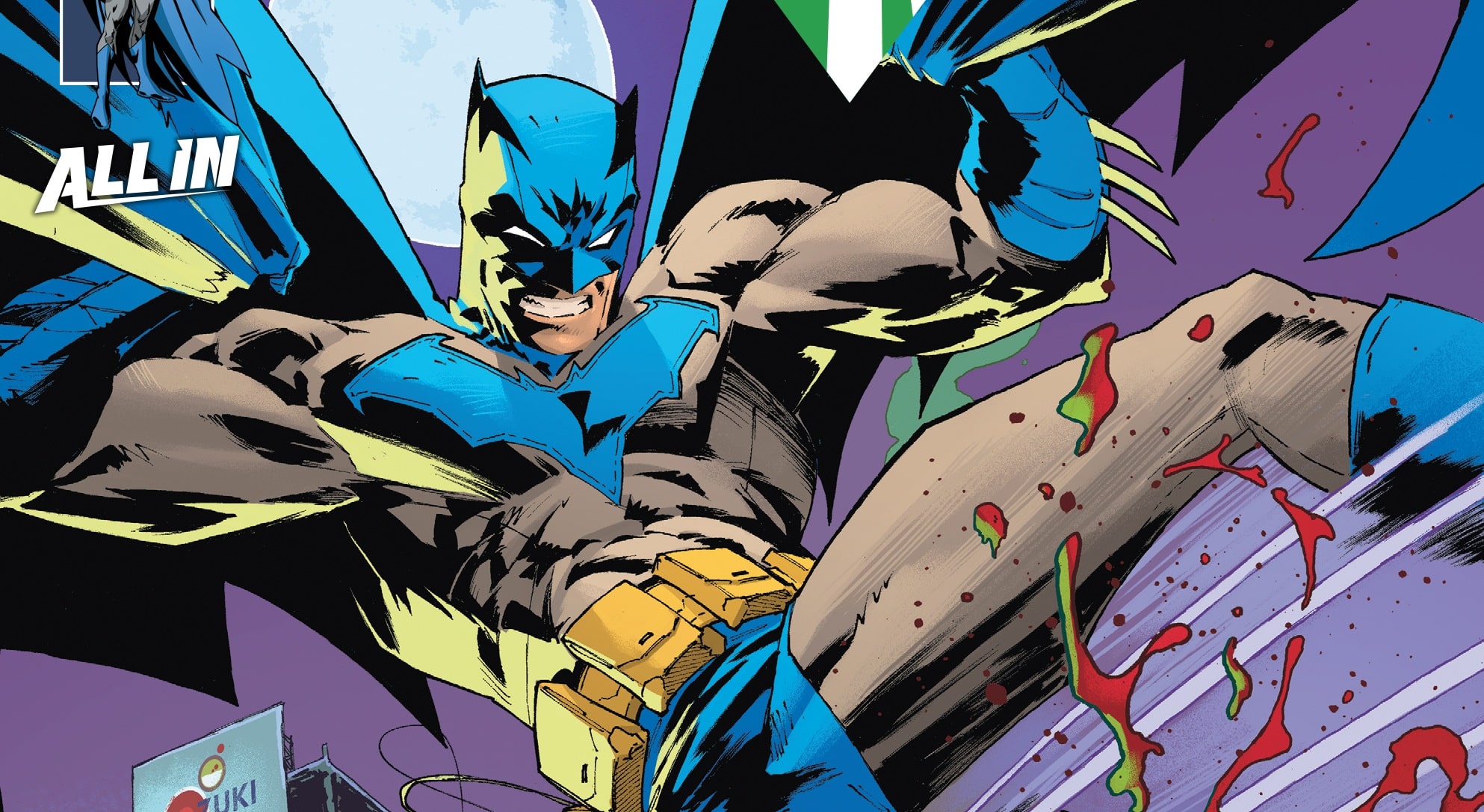It ends where it began. Batman, Batgirl and Red Hood hunt down the Jokers to stop their plan from coming to fruition and creating a new third Joker, hearts are broken and secrets are revealed in Batman: Three Jokers #3 from Geoff Johns, Jason Fabok and Brad Anderson.

Robert Secundus: Some say Three Jokers will end in murk,/ Some say in spite./ From what I’ve read of Johns’ work/ I hold with those who favor murk./ But if it had to read it twice,/ I think I know enough of shit/ To say that for Three Jokers spite/ Would also fit/ And would be right.
Andrea Ayres: Three Jokers #3 is page after page of steamrolling the reader with uninteresting character developments and discussions about trauma which are at best superficial and at worst harmful. Trauma is more than running on a treadmill to escape pain. It’s more than smashing a camera. It’s more than a kiss that shouldn’t have happened. For Johns, there is no room to explore the deeper side of trauma or the mindset necessary to confront it because he was too intoxicated by his own writing to see it didn’t work.
Matthew Lazorwitz: I have read every in-continuity Batman comic since January 1990. I have read at least 90% of out-of-continuity Batman stories in the same period. This… is nonsense, regardless of whether you treat it as in or out of continuity. It contradicts its own starting point. It contradicts itself thematically from page to page, and even if that’s intentional, it is frustrating. It is not worth your time.
The Monarch Theater Redemption
AA: I have a lot of feelings about representations of trauma in comics. First of all, we have the Joker telling Barbara to smile with a camera. Not super subtle, Johns. Clearly the Joker wants to invoke her trauma, but it couldn’t get more blatant. It feels gross because it is so unnecessary. I think that’s what bothers me about the entire series the most. It is constantly hitting you over the head with every damn detail. It treats the reader like they are absolute and utter fools. Batman’s parents died in an alley behind a theater, so here we are in a theater! Get it? There’s no room for nuance here. None at all. It also doesn’t feel original, fresh, important or vital. It feels like a tired collection of stories in a tired plot.
For Jason, Barbara and Bruce, all Three Jokers says to me about trauma is that it is a convenient plot device. When it is necessary, it is there to impart an emotion, and when it’s no longer needed, well, we can just forget it! Throw it in the trash (literally in the case of this issue).
The joker as a vessel for which each character must process their trauma is problematic. The Joker’s evocation of specific traumas and the character’s subsequent response signals a kind of permission structure I’m not comfortable with. The Joker’s presence as a way of giving form to the trauma, as if he is necessary for the reader to believe the trauma is real or that it happened. He must say it or allude to it, otherwise we can’t really believe it exists. By extension this gives the reader permission to feel as if the character’s trauma is real because the Joker says so. That too closely echoes the damaging societal message people receive about trauma. Which is to say that in order for us to believe the trauma happened, other people must confirm it for us. Also, it’s just so fucking cheezy to have Barbara smash the camera. Was I the only one to feel this way?
To get back to the actual issue, however, having the Joker there as a vehicle for trauma processing also seems to undercut any of the work these characters did on their own on their journey? I also don’t understand why at the end of this issue Batman is seemingly unable to or unwilling to see himself as part of the group of people who will have to contend with the trauma the Joker has perpetuated on him? The experience we have with trauma does not end just because someone has perhaps redeemed themselves or because we have chosen to forgive them. Confronting and dealing with trauma can be a lifelong process, and the way Three Jokers manifests it is too tidy, too simplistic.
So why does any of this matter? It matters because this story seems to want to say something about trauma, but I don’t think Johns knows exactly what that is? Is there a way we can talk about trauma without boiling it down to this sort of superficial mess? I hope to God there is, but this comic does a piss poor job of that. There were so many chances and opportunities available, and each time Johns took the easy way out.
ML: I don’t know what I can really add to the discussion of trauma, because that’s… really a lot to take in (in the best possible way). I just know that I’m bothered by the fact that Batman’s confrontation with Joe Chill, something that in the past has been portrayed as the most operatic of superhero melodrama, here is almost a footnote to one of the Joker’s schemes. And the fact that Joker arranges it so he can be Batman’s biggest trauma cheapens everything about the moment. Both the moments in the alley and in the hospital are pat, cheap moments to play on Chill’s redemption, something we haven’t seen him earn. It’s a lot of tell, don’t show.
And speaking of redemption, that sequence where Jason Todd leaves a note taped to Barbara’s door, only for it to fall off and be swept away? I know that’s supposed to symbolize all sorts of things, like about how healing can’t be put on someone else, or how sometimes fate takes a bad turn, or some similarly maudlin sentiment, but I think it just symbolizes this book being swept away by a janitor.
RS: I can’t stop thinking about the final pages of the book, and the images it centers around Batman. There’s Joe Chill’s headstone, and I think that’s supposed to mirror the broken headstones of his parents at the start. Remember that? So long ago? When we were so much younger? Batman knocked over the graves because of a wound, and then flashed back to all his physical and psychological traumas. Now he visits a grave without breaking anything. Is this supposed to reflect growth? But then what in the character has changed? Like you said, Andrea, he doesn’t see himself as really part of any group, any family. The fundamental problem throughout this series has been his inability to connect with his traumatized family members. He failed Jason, and he struggles to have a relationship with Barbara. So what’s the final shot? Bruce Wayne standing alone, looking at a family that doesn’t know he’s there. He’s alone and isolated in the cold. I want a story about Bruce Wayne confronting his childhood trauma. I want a story where Bruce Wayne even has to confront Joe Chill, and grapple with all the things that placed Chill in that alley and placed a gun in his hand. But I want it to actually mean something, both for the character and for the reader.
The End No One Was Asking For?
ML: OK, folks, strap in. I have really done my best to not go full-on psycho Batman fanboy at any point in these Three Jokers reviews, but the last two pages of this issue have gotten me to enter full-on rant mode. This is dealing with continuity, minutiae and some personal interpretations of who Batman is, so it might be a bit much, but I gots to do it.
I have two points that need to be called out: one technical and one philosophical. I’ll start off with the former, which will feed into the latter. The inciting incident of Three Jokers took place in Justice League #50, a comic with the same writer and artist as this one. This is important to note, because if there was a different creative team, there might have been miscommunications. There was not. In that issue, Batman had taken possession of the Moebius Chair, a product of New Gods tech that allows the person sitting in it to be in touch with pretty much all the knowledge of the universe. In conversation at the end of the issue, Batman and Green Lantern (Hal Jordan) are talking, and Hal says he heard Bruce ask the chair one last question before giving up its power. That question was: “What’s the Joker’s real name?” and he is told there are Three Jokers. So, if in fact, as the end of this issue flat out states, Batman has known the Joker’s name since one week after they met, why in the ever loving hell did Batman waste his last wish from Metron’s magic knowledge chair on information he already knew?
The answer is, Johns wanted to give a moment of fan service, one of those moments that proves how “cool” Batman is since he knows everything. And that is a fundamental misunderstanding of who Batman is. A Batman who knows everything going into a confrontation is boring. Just because you’re the smartest guy in the room, which Batman is, doesn’t make you the god of knowledge. Batman is mortal, which is what makes him the character I love. I can’t be Batman, and anyone who says they can be is fooling themselves. But he’s still clever, and I can at least be that. If you want the moment that perfectly encapsulates what Batman is to me, you need to look back at Grant Morrison’s JLA #3. In that issue, a group of powerful aliens has taken out the entire rest of the Justice League’s Big Seven and leaves Batman for dead because they don’t think he’s a threat, and for another reason that Batman picks up on. And with nothing more than that observation, knowledge and some gasoline, Batman takes out four of the aliens that took out Superman, Wonder Woman and the Flash one on one. It’s not because he’s a god. It’s not because he has a plan for every eventuality. It’s because he can be put in a situation that he’s not ready for and think his way out of it. By making Batman know everything, you are diminishing what makes the character great.
End rant. We now return you to your regularly scheduled review, already in progress.
AA: It is hard for me to add more on what you’ve touched on there, Matt. I remember watching the Batman films with my dad growing up, or the Adam West Batman show, and what we loved about the character was his humanity. You can’t have that humanity without the flaws, without the knowledge that this character is kinda making it up as he goes along, like the rest of us on this planet. I think what resonated with me about Batman as a kid was his ability to still retain humanity, that includes his sense of humor. I guess that’s part of what I find so irksome about Dark Batman All of the Time. It’s not a personality, it’s not interesting. It’s one-dimensional brooding that feels so boring, so tired.
RS: Not only do we get nothing interesting of Batman by the end, we get nothing interesting of the Joker. Who is the Joker at the end of this story? The one we knew from before. The sadistic bastard in most DC comics. Three Jokers revealed Three Jokers only to leave us with one who’s extremely familiar, and then to affirm that the previously suggested backstory of that Joker was accurate. The story began with Justice League #50 asserting the Joker’s name was something important; now we’re told that not only will we never learn it, but that we should have never expected it to be important. Throughout this story we’ve been told that Batman needs a Better Joker, a Joker rooted in Batman’s history somehow; now we’re told that no, that’s a bad idea, and that the Joker should be an empty void. Pure chaos. And weirdly, the story actually does, by doing this, manage to communicate something about the Joker. It emphasizes why, when he’s not used very carefully, very intentionally, and adjusted to the particulars of a story, when he’s not directly invested with meaning, the Joker is such a difficult character. It’s because the Joker at his core is boring. Nothing is boring. Emptiness is boring. You can have interesting stories about The Riddler, or Poison Ivy or Kite Man [Grote’s Note: Hell yeah]. The Joker can be in interesting stories, but the Joker can’t be the interesting story.
The Story as a Whole
AA: I have droned on for too long within this text, but here is how I can summarize my experience with it. Human misery, human agony are often sources of folly for the Joker. What upsets me about my experience reading Three Jokers is that it feels like misery isn’t just a subject to explore but the entire point. If no character may know anything else but pain and suffering, then it renders misery meaningless, which I suppose is an apt way for me to end my portion of this review.
ML: This series has been a three-issue exploration of four characters I do not recognize. It’s messy, shlocky and melodramatic in the worst possible ways, the ways they exploit the pain of the characters, and thus the pain of the people who may feel associations with them. In the end, while I think I see what the series was trying to say, I’m not sure, because the mixed messages throughout left me perplexed. What seems to be creators making a statement about the Joker just became a lot of nothing.
RS: The thing I don’t understand is that this issue almost seems angry at itself and at Johns. Remember Justice League #50? Not only are we going to make sure you know that isn’t in continuity with this story, featuring a very different Joe Chill, but we’re going to make sure you know that that story is bad. The Batman needing to ask the Joker’s name? PREPOSTEROUS! Of course the Bat God knows the Joker’s name! Remember the premise of this series, that there are multiple Jokers? We’re going to get rid of them. There’s just the one! The one you know! Remember all this speculation of who should be the new Joker? Remember the basic narrative tension that this series was built on? You were a fool if you bought into it! The thing we wanted you to be invested in was bad actually, and the Joker should never have an identity or connection to Batman! Three Jokers aggressively hates the story that generated it, it aggressively hates its readers for wanting the things it sells them, and it aggressively hates itself for existing. I just don’t understand why someone would make something like this. And I don’t understand what people enjoy in it. On Comic Book RoundUp, the final issue has an 8.1 out of 10, and I will just never understand that.
Bat-miscellany
- I think Johns really wanted, “God, it hurts to laugh” to be this line that the Criminal said that leaves an impression, that becomes something the reader remembers. It did, but not in the way he wanted, because it’s such a hamfisted line that doesn’t matter.
- Jason Fabok did some good work with what he was given. And Brad Anderson’s muted colors certainly suited the story. That’s about all I have to say about the art.

